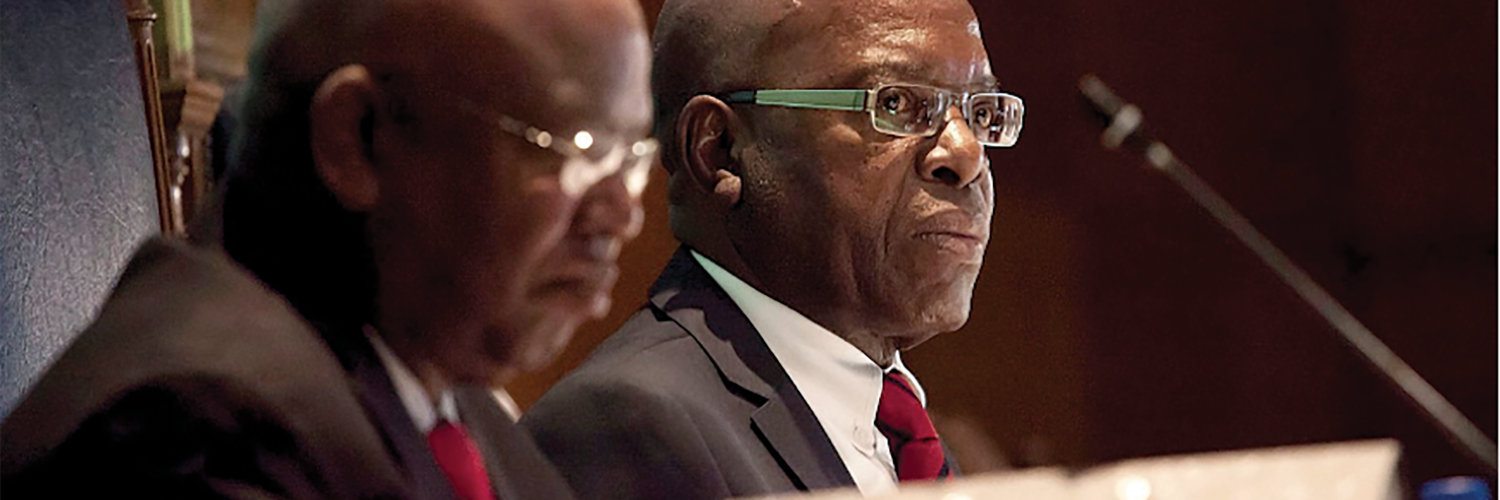FREE: Commission says judges are protected under certain laws in the case of committing errors and entitled to protection under the Constitution and the JSC Act…
By Monk Nkomo
Two high court judges who faced censure following their handling of the controversial multi-billion arms deal inquiry have been absolved of wrongdoing.
In dismissing the complaint against the two retired high court judges, Willie Seriti and Hendrick Musi, the Judicial Service Commission said if judges were to be subjected to disciplinary processes for the errors and misdirections they committed whilst performing their duties as Commissioners, that would seriously undermine their protection guaranteed to them by the Constitution and the Judicial Service Commission with the result that in future they would be reluctant to accept appointments to lead Commissions.
This was the recent unanimous ruling by the Judicial Conduct Committee (JCC) when they dismissed an application, submitted on August 11, 2020, by two complainants, Shadow World Investigations and Open Secrets who wanted the two retired senior judges, Seriti, former Judge of the Supreme Court of Appeal and Hendrick Musi, who was Judge President of the Free State, to account for alleged misconduct while presiding over the Commission of Inquiry into the Arms Deal whose report was released on December 23, 2015. The Commission was instituted by Jacob Zuma who was President of the Republic of South Africa.
The two NGOs alleged that the two Judges had failed to adequately probe claims of fraud, ignored certain information and that they should account for their alleged failures.
The JCC in its final report, however, ruled that the mere fact that the two Judges considered it unnecessary to follow the leads arising from the information placed at their disposal or treated the evidence in a particular way, did not constitute judicial misconduct. A Commission of Inquiry appointed by the President in terms of the Constitution, was entitled to adopt its own procedures, including those related to the admission of evidence, unless the Commissions Act 8 of 1947 or the President had provided otherwise.
They also ruled that Judges were protected under certain laws for committing errors.
‘’Section 15 (2) (c) is there to protect the Judges, who while performing their core judicial or non-judicial functions, commit errors and misdirections, such as ignoring certain material which they ought to have considered. This protection is necessary to ensure that their independence and impartiality are maintained.’’
The two Judges were therefore entitled to the protection afforded by the Constitution and the JSC Act. It was not so much about the roles the Judges performed which determined their protection, but their status. The fact that the alleged misdirections were committed when the two Judges were not performing their core judicial functions does not detract from the objectives which part of the Act sought to achieve. ‘’ The complaint in this matter solely relates to the outcome of the Commission and falls to be dismissed. In the circumstances, the complaint is dismissed in terms of section 15(2) (c) of the Judicial Service Commission Act.’’
The complainants had submitted that the issues relating to the merits of the complaint in relation to the conduct of the two Judges had already been determined by the full court and that the JCC was bound by the findings of the court. They contended that it was not open to the JCC to reconsider the merits. It was obliged to proceed on the basis that the findings were correct.
‘’ The complainants’ contention in this regard is erroneous’’, the JCC said. In its judgment in the review application, the High Court had made no findings of incapacity, gross incompetence and misconduct against the two Judges. A totally different test was to be applied to assess the conduct of a Judge. ‘’ The full court rightly held that the JSC would have failed in its duty if its judgment were to be used as a basis for impeachment without an articulation of a different test and application thereof.’’
The JCC also lashed at attempts to link the two Judges to bribery allegations – without any basis.
“Allegations of bribery against any person, let alone a judge, are serious. They have reputational consequences and may impair the dignity of the affected person. When a complaint is raised against a Judge, that Judge is expected to account for it and respond.’’
The embattled judges had challenged the application by the complainants and initially stated in their representation to the JCC that they (two judges) fell outside the purview of misconduct proceedings and neither the Judicial Service Commission nor the Chairman of the JCC had legal authority to submit them to misconduct proceedings.
They submitted that after a long drawn out inquiry which was conducted in public, the Commission found no evidence of corruption, malfeasance or irregularity in the awarding of the contracts.
These findings were, however, challenged by Corruption Watch and others including Hennie Van Vuuren, Paul Holden and Andrew Feinstein. On June 21, 2019 the Full Bench of the Gauteng High Court in Pretoria comprising Judge President Dustin Mlambo, JP Davis and JP Leeuw, set aside the recommendations and factual findings of the Commission.
In their ruling against the two complainants, the JCC said both Seriti and Musi were at liberty to determine the manner in which an investigation was to be conducted. In their response to the complaint, they did give an explanation why they dealt with the evidence, the witnesses and the information placed before them in the manner that they did.
‘’ There is absolutely no basis to impugn our integrity and dignity by a postulation that we may have been having a desire to reach a predetermined outcome. This is plainly insulting. No evidence of whatever nature or any factual predicate is offered to suggest such an inference’’.
They emphasised that the High Court did not find that there was any corruption which the Commission found and ignored. The court did not consider the entirety of the Commission’s report or the evidence which the Commission gathered and looked at in its entirety. ‘’The allegations made by the complainants are in large measure unfounded and in certain instances downright incorrect’’.
According to both former judges, it was strange that the complainants accused them of not conducting a meaningful investigation, particularly, given the fact that they had rebuffed the Commission’s efforts to have them testify before the Inquiry.


































